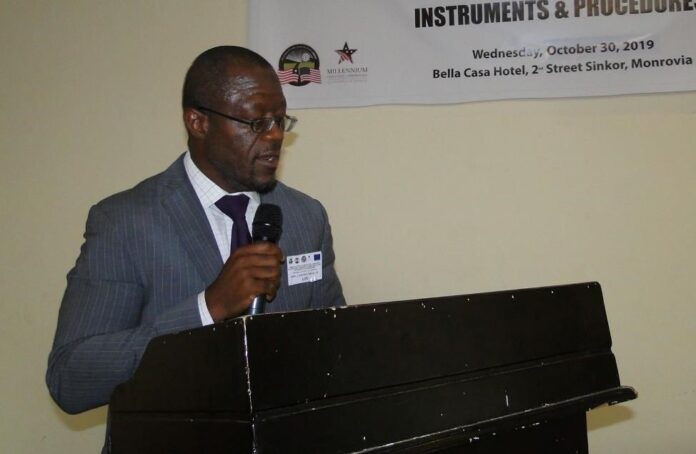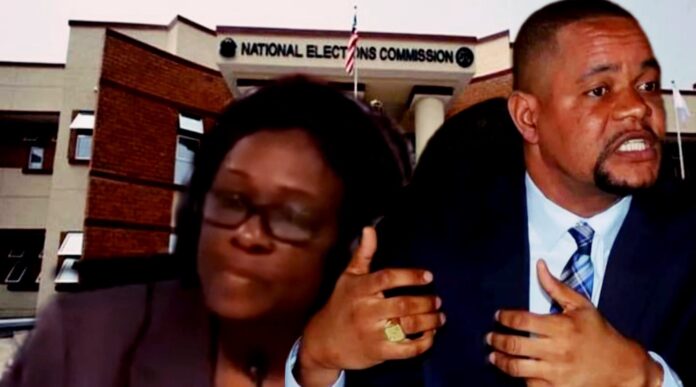MONROVIA – Central Bank of Liberia (CBL) Governor Alloysius Tarlue’s recent statement that the bank does not keep or have records of transactions between private companies or individuals and their commercial banks, whether local or international has exposed the CBL’s lack of a proper mechanism to oversee and enforce the monetary policy of the bank and must be called to order by the Board of Governors of the Central Bank of Liberia.
Mr. Tarlue exposed his inadequacy in the performance of his job as Governor of the CBL when he issued a statement in reaction to reports by this website that he’s being accused of allegedly covering up a 2 million euros scandal at the GTBank.
Tarlue said that despite earlier informing former Solicitor General Cephus that the said money did not come into the country, Smart News opted to report, what he described as a misleading story without a full appreciation of CBL’s operations.
Tarlue also claimed that contrary to the website report, he did not receive communication from any lawyers said to have represented the Candy Group International, and neither did the Bank receive findings of any investigations upon which it failed to act.
But Tarlue did not also say that he actually received all the documents in relation to the transfer of the amount. He deliberately failed to tell the public that he received the Swift Transfer Documents and the Tracking Code which proved the money actually landed at Hamak’s Account at GTBank Liberia.
The CBL in its rebuttal assures the Liberian people of its unflinching commitment to building a strong and credible financial system. The Bank encourages Smart News to make the efforts to properly investigate the operations of the banking system to avoid such “misleading reporting intended to bring the CBL into public disrepute.’
Smart News insists that the Governor has done nothing to give justice to the Candy Group International. Even though Governor Tarlue claimed he did not receive complaints from the lawyers representing CGI, it also did nothing to find out whether the allegation made against GTBank by the investors is correct, when he received all documents regarding the transfer from other investigators of the Case.
The Governor requested for relevant documents on the transfer that would serve as a basis for the investigation of the case by the CBL. He has all the transfer papers in his possession that include Swift Tracking Code, yet shows no Interest in investigating.
Central banks everywhere are responsible for overseeing the monetary system of a country, including the movement of money within that system. Monitoring the movement of money is a crucial aspect of a central bank’s responsibilities, as it allows them to track the flow of funds throughout the economy, identify potential risks to financial stability, and implement policies to promote economic growth.
Therefore, it is not possible for central banks not to monitor the movement of money in a country. However, the extent and granularity of monitoring may vary depending on the specific policies and regulations in place.
For instance, some countries may impose stricter regulations on cross-border transactions or require financial institutions to report larger transactions, while others may have more relaxed regulations.
Nonetheless, regardless of the specific policies in place, central banks will always need to monitor the movement of money to fulfill their mandate of maintaining financial stability and promoting economic growth.
If central banks do not monitor the movement of money in a country, it can lead to various risks to the financial system and the wider economy.
Money laundering and terrorist financing are some of the risks. Without proper monitoring, it becomes easier for criminals and terrorists to move funds across borders and to engage in illegal activities such as money laundering and terrorist financing.
Financial instability is another risk. The lack of oversight can lead to an increase in risky financial activities such as speculation, which can create financial bubbles and ultimately lead to financial instability.
Another risk is Economic imbalances: Failure to monitor capital flows can result in economic imbalances, where too much money flows into or out of an economy, leading to inflation or deflation, etc.
This is why the statement of Governor Tarlue that the CBL does not monitor money movement between and amongst companies, individuals and commercial banks is very disturbing and concerning; because without proper monitoring, it becomes easier for individuals and companies to evade taxes, which can decrease government revenue and reduce the capacity of governments to provide public services and as well damages the em age of the country.







